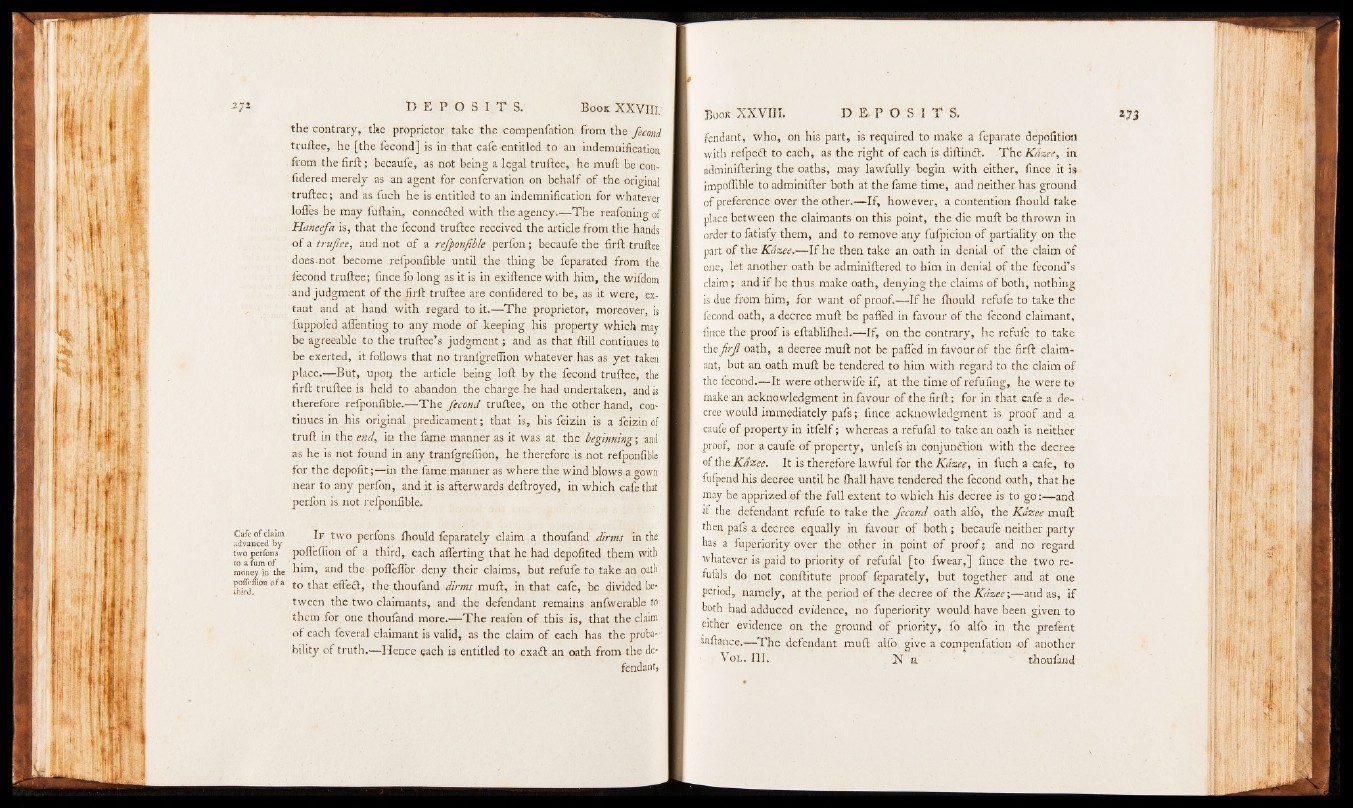
D E P O S I T S . Book XXVIII.
the -contrary, the proprietor take the compenfation from the fecmd
truftee, he [the fecond] is in that cafe entitled to an indemnification
from the firft; becaufe, as not being a legal truftee, he mud be con-
fidered merely as an agent for confervation on behalf of the original
truftee; and as fuch he is entitled to an indemnification for whatever
lofles he may fuftain, connected with the agency.— The reafoning of
Haneefa is, that the fecond truftee received the article from the hands
of a truftee, and not of a refponfible perlbn; becaufe the firft truftee
does.not become refponfible until the thing be feparated from the.
fecond truftee; fince fo long as it is in exiftence with him, the wifdom
and judgment of the firft truftee are confidered to be, as it were, extant
. and at hand with regard to it.— The proprietor, moreover, is
fuppofed aflenting to any mode of keeping his property which may
be agreeable to the truftee’ s judgment; and as that ftill continues to
be exerted, it follows that no tranfgreffion whatever has as yet taken
place.— But, upon the article being loft by the fecond truftee, ..the,
firft truftee is held to abandon the charge he had undertaken, and is
therefore refponfible.— T h e fecond truftee, on the other hand, continues
in his original predicament; that is, his feizin is a feizin of
truft in the end, in the fame manner as it was at the beginning; and
as he is not found in any tranfgreffion, he therefore is not refponfible
for the depofit;—in the fame manner as where the wind blows a gown
near to any peifon, and it is afterwards deftroyed, in which cafe that
per-fon is not refponfible.
Cafe o f claim I f two perfons fhould feparately claim a thoufand dirms in the
two perfons ponemon o f a third, each aflerting that he had depohted them with
money in the him, and the pofleflor deny their claims, but refufe to take an oath,:
third*0" °fa to tha.t effeft, the thoufand dirms muft, in that cafe, be divided between
the two claimants, and the defendant remains anfwerable to
them for one thoufand more.— T h e reafon of .this is, that the claim
of each feveral claimant is valid, as the claim of each has the probability
of truth.— Hence each is entitled to ,exadt an oath from the defendant,
fendant, who, on his part, is required to make a feparate depofit ion
with refpect to each, as the light of each is diftinft. The Kdzee, in
adminiftering the oaths, may lawfully begin with either, fince it is
impoffible to adminifter both at the fame time, and neither has ground
of preference over the other.— If, however, a contention fhould take
place between the claimants on this point, the die muft be thrown in
order to fatisfy them, and to remove any fufpicion of partiality on the
part of the Kdzee.— I f he then take an oath in denial of the claim of
one, let another -oath be adminiftered to him in denial of the fécond’ s
claim ; and if hç thus make oath, denying the claims of both, nothing
is due from him, for want o f proof.— I f he fhould refufe to take the
fecond oath, a decree muft be pa fled in favour of the fecond claimant,
fince the proof is eftablifhed.— If, on the contrary, he refufe to take
the firji oath, a decree muft not be pafl'ed in favour o f the firft claimant,
but an oath muft be tendered to him with regard to the claim of
the fecond.— It were otherwife if, at the time of refuting, he were to
make an acknowledgment in favour of the firft ; for in that cafe a decree
would immediately pafs ;. fince acknowledgment is proof and a
caufe of property in itfelf ; whereas a refufal to take an oath is neither
proof, nor a caufe of property, unlefs in conjunction with the decree
of the Kdzee. It is therefore lawful for the Kdzee, in fuch a cafe, to
fufpend his decree until he (hall have tendered the fecond oath, that he
may be apprized of the full extent to which his decree is to go:— and
if the defendant refufe to take the fecond oath alio, the Kdzee muft
then pafs,a decree equally in favour of both ; becaufe neither party
has a fupèriority over the other in point of proof ; and no regard
whatever is paid to priority of refufal [to fwear,] fince the two ref
i lls do not conftitute. proof feparately, but together and . at one
period, namely, at the, period of the decree of the Kdzee;— and as, i f
both had adduced evidence, no fupèriority would have been given to
either evidence on the ground of priority, fo alfo in the prefent
Mftatice..—The defendant muft alfo. give a compenfation -of another
Vol. III. K n ' thoufand